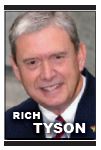By Richard Tyson
My father, Herbert G. Tyson Jr., was a World War II hero. He was awarded the Bronze Star for heroic service in a combat zone. His heroism, however, was not for specific battlefield actions. Rather, it was for his continuous actions every day for over 1,200 days during the war.
You see, my dad was a prisoner of war, incarcerated by the Imperial Japanese Army in the Philippines after the surrender of the Bataan Peninsula in April 1942. He survived the infamous Bataan Death March and incredible brutality, starvation and disease through the course of the war until his eventual liberation. His heroism might be summed up in one word: “survival,” both his own and that of his fellow soldiers who made it through.
Dad passed away in 1993. He seldom spoke of his ordeal as a POW, but on one rare occasion, he shared experiences that he said broke his heart. Like all of his fellow prisoners, he longed for the war to end, for America to triumph and to return to his family. This hope made it possible to endure their daily trials; it literally kept them alive.
While such hope was essential, my father soon learned that it had an insidious, even fatal, aspect to it. When a prisoner would articulate a specific date by which he knew they would be liberated, this often set the date for that man’s demise. Dad tearfully shared instances where his buddies said they were sure that they would be home by Christmas. When that day passed, discouragement became the final impetus for their death.
Dad and his fellow prisoners soon began to plead with one another not to hang their hopes on a given date. As he put it to me, “Faith shouldn’t have deadlines.”
Viktor Frankl, in his classic Man’s Search for Meaning, shared similar insights as a holocaust survivor at Auschwitz: “The prisoner who had lost faith in the future — his future — was doomed. With his loss of belief in the future, he also lost his spiritual hold; he let himself decline and became subject to mental and physical decay. We all feared this moment — not for ourselves, which would have been pointless, but for our friends.”
In March, Pres. Trump expressed his hope that America’s churches would be full on Easter, and in April, that the economy would be back open by May 1. He has been roundly criticized for such optimism in the face of the virulent coronavirus. I am not among his critics for this. I believe his statements simply reflected his hope that this deadly disease would be in check by that date.
That said, I think there’s an important message here. Worldwide, we all hope that the pandemic will end soon. Each of us should, as Viktor Frankl counseled, have “faith in the future.” But like my father said, “Faith shouldn’t have deadlines.”
In spite of all the brainpower and investment that is being channeled toward eradicating COVID-19, we simply don’t know when that will occur. We can rest assured that it will, but we should recognize that it’s likely to take months or more.
Personally, I have great faith in our medical experts, researchers and pharmaceutical companies. But no one saw this coming. Because of that, the world was not prepared. That means that we each have to do our part to flatten the curve by limiting social contact and being prudent in terms of cleanliness and general health practices. These are certainly inconvenient, but when I think of what my father or Viktor Frankl had to adapt to, it seems clear that we can do this.
Beyond my faith that the disease will ultimately go away, I also have faith that the economic impact we are experiencing will also be resolved. In the near term, we are all disrupted. Many of us never thought that economic survival would be a personal issue. I offer this caution: “Don’t wait for some date in the future for the economy to turn around!”
Consider how you can revise your business model to adapt to the new normal. The seeds of great opportunity are often found in the trials and tragedies of life — and of business. Treat the time that you are required to “socially distance” as a gift whereby you can plan not only to survive, but ultimately thrive.
I began this article paying tribute to the heroism of my father. I end it with a challenge: How might each of us act heroically each day during these challenging times?
Richard Tyson is the founder, principal owner and president of CEObuilder, which provides forums for consulting and coaching to executives in small businesses.








